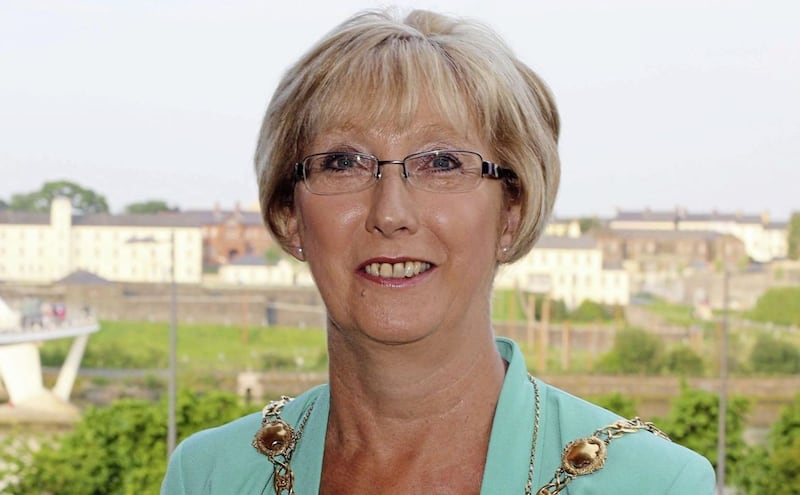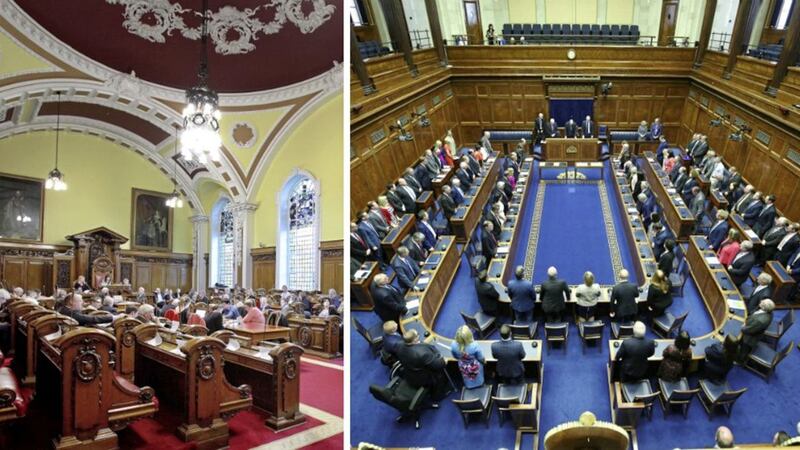Talks to restore Stormont have sparked debate on the 'petition of concern', a cross-community veto intended to prevent discrimination, but controversially used to block decision-making. All the main parties want to either remove or reform it, but disagree on how. Brendan Hughes examines how the north's 11 councils use a different procedure known as a 'call-in', and asks whether this could be the solution to the deadlock
IT WAS meant to be a key safeguard to power-sharing, but is now seen as a stumbling block to Stormont ever being restored.
Introduced following the Good Friday Agreement, it was hoped the petition of concern (PoC) mechanism in the assembly would prevent discrimination of one community over another by making contentious votes require cross-community support.
But its controversial use in blocking some decisions has led to calls for it to be reformed or completely removed.
It has been used by MLAs from almost every party and on a range of issues, from same-sex marriage to welfare reform legislation, and even to stop reprimands against politicians.
Critics say PoC has long been abused, but supporters say that when used correctly, it protects communities against being adversely affected by assembly decisions.
The DUP – which has deployed the most PoCs and has also faced the most criticism over their use – says it now wants the mechanism scrapped.
Sinn Féin, SDLP, UUP, Alliance and the Green Party want it "reformed" rather than removed, but there is disagreement on how it should be changed.
However, an alternative mechanism is already operating in Northern Ireland that could provide an answer.

The north's 11 councils have what is known as a 'call-in' procedure.
It was introduced by the Stormont executive as part of wider local government reforms in 2015 which reduced the number of councillors and local authorities, while also giving them increased powers.
PoC was used more than 100 times in the assembly between 2011 and 2016.
It requires 30 MLAs' signatures. Once secured, an assembly vote will only pass if supported by 60 per cent of MLAs voting and 40 per cent of those designated as nationalist and unionist.
In practice, it means larger parties are able to block decisions based mainly on the strength of their own numbers alone, regardless of their reasons for using the veto.
By contrast, a call-in requires less support to be deployed (just 15 per cent of councillors), but will only be successful if it meets certain criteria.
Councillors can request a call-in if they feel a decision did not properly consider the relevant facts and issues; or the decision would disproportionately and adversely affect any section of the inhabitants of the district.
The council then asks a lawyer to examine the decision to determine whether it should be reconsidered.

There is also no need to designate councillors as nationalist or unionist as part of the call-in process.
A total of 30 call-ins have been requested since the process was introduced, according to details obtained by The Irish News through Freedom of Information requests.
On eight occasions, changes were made to the original decision following the call-in. No changes were made on 15 occasions, six remain under consideration and one outcome was not disclosed.
Causeway Coast and Glens, a majority-unionist council, had the most call-ins with 11, followed by Derry and Strabane council and Antrim and Newtownabbey council, both with four.
Belfast City Council, which has had three call-ins, is the only authority without an overall nationalist or unionist majority – with Alliance tending to hold the balance of power in decision-making.
Michael Long, Alliance's group leader on the council, welcomed the call-in process.
He said something similar to the call-in process "might be one way forward" in addressing PoC concerns at Stormont.
"I think it is a useful opportunity where decisions can been looked over again," he said.
"If Sinn Féin and the DUP decide to come together on an issue, they can see more things through without any other support. It gives us a mechanism to highlight our concerns."
Mr Long said he believed call-ins have been used "more sparingly or more sensibly" in councils compared to Stormont's PoC because of the need for councillors to justify their concerns.
But DUP councillor Hilary McClintock, who sits on the majority-nationalist Derry and Strabane council, said there are issues with the speed of the process.
"Once we put in the call-in it goes to a barrister to look at the legalities over it, and that takes so much time," she said.
But she added: "It's a mechanism whereby you can highlight an issue that is unfair, and because the unionist community would be very much in the minority, it is an option."
Asked whether the call-in process could be used instead of PoC at Stormont, she said: "It's one that's worth considering. I think that's something that should be looked at."
SDLP councillor Declan O'Loan sits on the majority-unionist Mid and East Antrim council – the north's only local authority where no call-ins have been used.
He said there has not yet been a decision "where a call-in would look like the obvious remedy", but added that there are also difficulties in securing enough councillors to support a call-in.
A Sinn Féin spokesman said: "Call-in provides a mechanism for councillors to intervene when they feel that a decision being made needs to be revisited (or possibly changed). It provides a key check and balance in the system of local governance.
"The role of call-in powers should be considered within the context of the full-range of scrutiny powers available to councils and meeting statutory obligations with respect to equality, rural needs, child poverty, addressing poverty and disadvantage and targeting resources on the basis of objective need."

---------------
:: Petition of concern vs council call-in
Petition of concern:
A valid PoC requires the signatures of 30 MLAs. If these are secured, an assembly vote can then only pass if supported by 60 per cent of MLAs voting, including at least 40 per cent of each of the nationalist and unionist designations present and voting.
Call-in:
A valid call-in requires the support of 15 per cent of councillors. They can request a call-in if they feel a decision did not properly consider the relevant facts and issues; or the decision would disproportionately and adversely affect any section of the inhabitants of the district. A lawyer is then asked to examine the decision to determine whether it should be reconsidered.
---------------
:: Number of times councils have used the call-in process
Causeway Coast and Glens: 11
Antrim and Newtownabbey: 4
Derry and Strabane: 4
Belfast: 3
Fermanagh and Omagh: 2
Newry, Mourne and Down: 2
Ards and North Down: 1
Armagh, Banbridge and Craigavon: 1
Lisburn and Castlereagh: 1
Mid Ulster: 1
Mid and East Antrim: 0
TOTAL: 30
(up to mid-December 2017)
---------------
:: Number of decisions changed after call-in
Changes made: 8
No changes made: 15
Still under consideration: 6
Undisclosed: 1
---------------
:: Party proposals on petition of concern
DUP: Remove
"The DUP proposed scrapping the petition of concern but this was rejected by other parties.
"We stand by that proposal to normalize the assembly structures.
"If there is now support for a fundamental reform of the assembly structures, then we would welcome that.
"However, so long as the current structures exist, we will continue to use them."
Sinn Féin: Reform
- Restrict to criteria in line with Good Friday Agreement (GFA) and equality legislation.
- Independent body to adjudicate on PoC use.
- PoC limited to decisions:
* adversely impacting on equal treatment of identity and ethos of any section of the community.
* incompatible with international human rights standards.
* directly connected to the Troubles conflict or its legacy.
* that would have disproportionate and adverse social or economic impact on a section of the community.
* relating to constitutional structure and institutions established under GFA.
SDLP: Reform
"The SDLP believes that the petition of concern should be restored to its original purpose to act as a mechanism to ensure assembly proofing against adverse impacts on rights and equality issues as laid out in the Good Friday Agreement."
UUP: Reform
"The Ulster Unionist Party wants to see the petition of concern reformed. It must be returned to its original purpose – to protect the minority."
Alliance: Reform
- Restrict PoC to matters of:
* national identity
* legacy of the Troubles conflict
* constitutional structure and institutions established under GFA
- PoC use should state grounds upon which it is tabled.
- Five-member panel to adjudicate on PoC use.
- Panel legally qualified and appointed by Assembly Commission through public appointments process.
- Protocol to be placed into law.
Green Party: Reform
- Scrap community designation of MLAs.
- Replace previous PoC voting with requirement for support from 60 out of 90 MLAs.
- PoC still to require signatures of 30 MLAs, but limited to matters of:
* national identity
* legacy issues
* constitution
- Three-member panel set up to adjudicate on PoC use.








